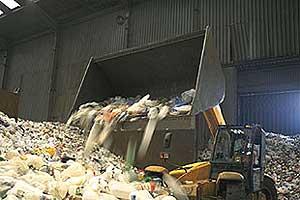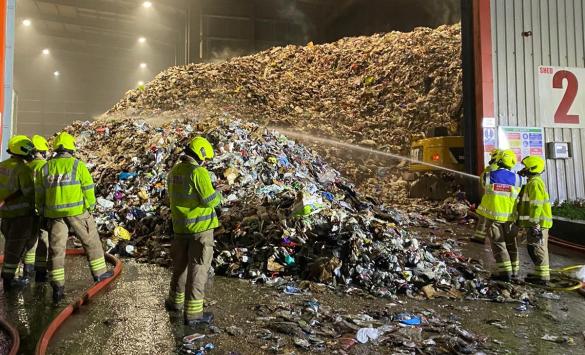In the private sector, one MRF operator, which chose not to be named, has said local authorities will have to adopt a flexible approach to fixed contracts while another waste company has produced a set of suggestions covering how the market could move forward.
Environment Agency
The Environment Agency today (November 4) appeared set to adopt a pragmatic approach to regulation of companies needing to store material. Some collectors of recyclable materials have said they are advising councils to ring the Environment Agency to get permission to store materials.
John Simmons, chief executive of plastic bottle organisation Recoup, which is believed to have some members who have large volumes of plastics bottles they urgently need to store, today confirmed that it is hoping the Agency will consider speeding up the approval timescale for storage facilities. He said: “Our hope is the EA can look at relaxing it.”
Elsewhere some materials recycling facilities are said to be running out of storage space and may need to make use of warehousing space.
Today the Agency told letsrecycle.com: “We recognise that these are exceptional market conditions and have potential implications for maintaining waste treatment capacity, achieving recycling targets and avoiding illegal disposal of waste.”
The Agency statement added: “We are preparing guidance for our staff and operators on how we can best respond to these challenges to minimise the impact on the environment.”
Larac
Lee Marshall, chair of LARAC, the Local Authority Recycling Advisory Committee, today said that he hoped there might be some leeway from the Environment Agency although he expected the argument to be put forward that there was still a market for materials at low prices.
He added: “It may be too late this time, but if the markets were to go like this again, perhaps we should have an emergency plan. It depends now on how bad it gets. If we have to start landfilling recyclables we will lose public confidence in recycling schemes and it will take a long time to build this up again. And, if we landfill biodegradable materials we are in danger of breaching our LATs targets.”
Mr Marshall said that in the majority of local authority contracts with the private sector, it is the private firm which shoulders the burden of risk although they also “get the income when it's good.” He added that some variations of contracts would now be needed to help keep material flowing.
Contracts
The idea of local authorities and contractors reaching some form of agreement on a temporary way forward was advocated today by one operator of UK materials recycling facilities.
The company said: “What we need to see is a good understanding of how serious the situation is by local authorities. Contractors do not want to stop providing a service but if we cannot afford to continue some contracts, yes the council could take us to court but this would achieve little. There will be costs incurred and there are few companies who will want to take over the contract at present. The better way forward is for councils to pay more to cover some of the shortfall in material value and we can agree on a structure so that when prices rise again a fair share of this increase can be returned to the local authority.”
Local Government Association
The Local Government Association said today it would be taking up councils' concerns with government. A spokesman said: “The global economic downturn has caused prices to fall in the materials markets, and clearly this has potential implications for councils. We have written to local authorities to determine the extent of the problems they may be facing. The LGA will take up any concerns our members have with the Government.”
The LGA spokesman added: “Prices can fluctuate significantly and consequently it is too early to speculate on what the impact may be on council finances. What the uncertainty does confirm is the need for the Government to make good its pledge to return the proceeds from landfill tax to local authorities so this money can be invested in recycling facilities.”
County Surveyors Society
Julia Barrett, chair of the County Surveyors Society waste panel and county surveyor for Cambridgeshire, said today that it was important “not to over-react. WRAP has put out some information and even with their vast database they are not sure whether the supply and demand in the market is settling down to a new equilibrium or this is a long term effect.”
Ms Barrett added that in terms of contractual relationships between councils and contractors, “this agenda is about partnerships and long-term relationships. These have to survive the good times as well as the bad one. We have to share experiences and problems and communicate and try and find innovative solutions. Local authorities haven't got spare cash and their long-term solutions are often predicated on future income.”
And, she said she would be concerned if the environment was the loser with unnecessary landfilling. “Potentially storing of material is an option. The Environment Agency has a part to play here and needs to be pragmatic in terms of licensing.”
Action plan
Waste management company Shanks today suggested a nine-point action plan to try and help ameliorate the current crisis. Director of materials management, Paul Dumpleton, said: “There is a huge amount of uncertainty in the marketplace at the moment and what is needed is a co-ordinated approach to solving both the short term needs and issues and the longer term viability of the industry. Although this is very painful at the moment, it has happened before and will happen again. It is just the speed and scale that is different.”
The nine-point plan includes:
- Regulation – The Environment Agency and the Scottish Environment Protection Agency giving support to the creation of additional storage facilities with the regulators taking a strategic view of short term needs.
- Enforcement of cash migration through system – Fiscal measures need to be in place to ensure cash migrates continually through the system. Keeping cash moving is the most efficient way of keeping the infrastructure in place particularly as we have moved from paying for the material to charging. Many are also going to need concessions on VAT and other central government tax payments.
- Flexibility of contracts with local authorities – There has to be a concerted effort by all parties to mitigate the short term problems in the industry, in some cases unrealistic charging or even in extreme cases payment for some local authority recycling contracts. Some of these contracts are just not sustainable and a degree of re-negotiation will be inevitable.
- Flexibility of contract with commercial suppliers – Inevitably packaging collections will reduce and that will should have a knock on effect on increasing PRN prices. This is just the time when these fiscal measures come into there own and enforcement is key.
- WRAP – WRAP was established to combat a perceived shortfall of UK reprocessing capacity as a result of legislation diverting material from landfill. WRAP has moved away from its original aim of providing end markets and we need to very quickly see this trend reverse. Centrally funded storage capacity would be one way forward.
- Quality standards – Quality always has been and always will be an issue. Paper mills take poorer quality when the market is good and don't when the market is bad. The industry has made great steps forward in the production of quality materials and this needs to continue. It is an absolute fallacy that single stream materials are solely responsible for quality issues in the UK. The biggest market problem is with mixed papers and it is irrelevant how it is collected.
- Greater transparency of the Asian market – Over the past few years a number of small traders have set up businesses who trade with other traders, who then sell into Asia. What is needed is shorter communication lines particularly with the Asian market to establish a more consistent supply line and to have a better understanding of market conditions and trends. It will not stop the fluctuations but should give the industry the best possible chance or reacting to those changes.
- Other uses of material – We have to also accept that at certain times of the supply and demand curve the UK could have to find alternative uses for some materials and that alternative use should be energy recovery.
- Communication – We need to communicate this for what it is, which is a short term painful market re alignment. We can not afford to shelve infrastructure development; we can not undermine the good work that the industry currently does and we certainly can not undermine investment in a sector that will continue to have a vital role in all our futures.












Subscribe for free